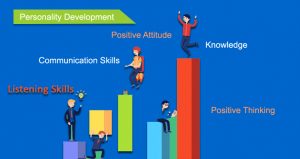
Research on career readiness and work personality development suggested that the two constructs have been found to be related to an individual’s ability to meet the demands of work. Hence, it is essential for every individual to understand the difference between career readiness and personality development and use it to grow both to have a successful career.
While Career Readiness is the process of preparing an individual with essential skills he would to find, acquire, maintain and grow within a job, Personality Development refers to how his organized pattern of behaviours emerges over time, shaping his unique personality.
There are several career readiness competencies that you will need to grow to succeed in your career path. Some of these competencies are Continual Personal and Professional Learning, Network Building, Professionalism, Technology, Equity and Inclusion, etc.
Personality Development competencies which you should develop include Communication Skills, Team Management, Goal setting & Time Management, Leadership Skills, Creativity, Critical Thinking, and many more. While career readiness competencies are primarily focused on improving your employability and professional career growth, personality development is focused on your overall growth as an individual. It will contribute to enhancing both your personal and professional life.
Let us learn more about Personality Development, factors that can impact the development of our personality and finally, how we can improve our personality.
We will start our discussion to understand the difference between Personality Development, Personality Growth and Personality Progress. It is essential to understand the difference between them so that you do not get confused between them.
As already discussed, Personality Development is the development of an organized pattern of behaviours and attitude which makes us unique and different from each other. It occurs by the ongoing interactions that happen between the temperament, character, and the environment.
Whereas, Personality Growth refers to growing emotionally and mentally. It is a process by which we recognize ourselves to reach our full potential. It is our personality growth that helps in improving our maturity, success and happiness.
While Personality Progress is the stages that you go through when you develop your personality. From childhood to adulthood, we go through various stages marked by distinctive changes in our thought processes. How we think about ourselves, others and the world has a very important part in forming our personality.
While our Personality growth and Personality progress are not directly in our control, our personality development can be controlled by us in several ways.
You can enroll for our several short courses focused on various personality development traits, or you can also enroll for the full course on Personality Development with us.
It can be extremely helpful to understand some of the factors that influence our Personality Development.
Factors Impacting Personality Development
Internal Factors
Let us begin with some internal factors which affect our individuality from the time of our birth.
-
Personality Development & Gender
There are 5 factors affecting personality formation in gender. These include the following:
- Neuroticism: the tendency to experience negative emotion and related processes in response to threats and punishment. These include emotions such as anxiety, frustration, depression etc. Women are usually higher on neuroticism than men.
- Agreeableness: This comprises traits such as empathy and kindness and involves an individual’s tendency towards cooperation, maintaining social harmony, consideration for others, etc. Women consistently score higher than men in this as well.
- Conscientiousness: This trait relates to being organized, self-disciplined, control of impulses, dutifulness. Women are somewhat higher than men in this trait.
- Extraversion: This reflects sociability, assertiveness and positive emotionality such as warmth, gregariousness etc. While women score higher on positive emotionality, men score higher in assertiveness and excitement seeking.
- Openness/Intellect: This reflects intellectual curiosity, creativity, imagination and appreciation of aesthetic experiences. No significant gender difference is noted on this trait.
-
Psychological Barriers in Personality Development
Let us understand what the psychological barriers to personality development are. Psychological barriers in personality development are seen when individuals have certain personality traits that disallow them to see change as positive or needed. The barriers can be categorized into 3 parts-
- Barriers to the admission of a problem include denial or trivialization, perceived invulnerability, faulty conceptualizations, and debilitating emotions.
- Barriers to initial attempts to change include lack of knowledge, low self-efficacy, and a dysfunctional attitude.
- Barriers to long-term change include Cognitive and motivational drift, lack of perceived improvement, lack of social support, and lapses.
These barriers can be overcome by making the individuals aware of the lacking and then mentoring and training them on personality development traits.
Want help with this? Connect with us for one-to-one mentoring and personality development training.
-
Values and Personality Development
Next, we discuss how values are involved in personality development. Our values help us grow and develop our personality. They inform our thoughts, words, and actions and impact decisions in life. There are three types of values that relate to an individual and his personality development. These are:
- Individual Values: Our values shape our lives and the principles that we consider important for our self-interest. Some of our values include enthusiasm, humility, personal fulfilment, and creativity.
- Relationship Values: Our relationship values reflect how we relate to other people in our life, such as our family, relatives, friends, colleagues and so on. Some of our relationship values include caring, openness, trust and generosity.
- Societal Values: This reflects how we relate to society. Some of our societal values are sustainability, environmental awareness, ecology etc.
-
Knowledge and Personality Development
Did you know what the contribution of learning knowledge to personality development is? Learning knowledge is important and plays a very important role in our lives and develops a very good personality. Personality Development is often conjugated with a good education. Some of the ways learning knowledge can enhance personality are as follows:
- Learning gives you knowledge
- Knowledge teaches you ethics
- Knowledge boosts your confidence
- Knowledge teaches you how to behave correctly
- Knowledge helps you develop healthy habits
- Knowledge helps in increasing memory and thinking skills
- Knowledge makes you more disciplined.
-
Impact of the Behavioural Problems on Personality Development
Often various behavioural problems are noted in children as they grow from the stage of a child to an adult. They face behavioural problems such as identity crisis, fickleness, problems with adjustment with friends and family, problems related to rapid development, security, recognition, gregariousness, and so on. It has also been found that behavioural conscientiousness issues, intelligence and consideration are seen more in girls while those related to activities are more seen in boys. At a younger age, extraversion is higher, and in older age, behavioural problems agreeableness and shyness are more. With college students, distraction ability is higher. While these behavioural problems directly impact their personality development, they can be easily resolved at an early age by mentoring, coaching, and personality development training.
External Factors
Let us now learn about some external factors which affect our individuality when we grow up.
-
Economics and Personality Development
Let us find out how economic determinants influence personality development. Economic determinants of a family can have a range of impacts on its members’ human behaviour and personality development. Some of the economic factors which have been seen to have an impact on an individual’s behaviour and personality are as follows:
- Family Income: It has been found that household income coupled with the parents’ educational background can have a major impact on their child’s personality. Individuals coming from high-income families are more patient and have less tendency for taking risks. They also score higher on IQ tests.
- Personal Income: When an individual’s income increases, he shows a more confident behaviour, whereas when the income level decreases, lack of confidence leads to stress, poor work-life balance etc.
- Liquid Assets: Individuals with more liquid assets are confident, patient and have a better work-life balance. Those without liquid assets are less confident and show a tendency towards taking risks.
-
Religion and Personality Development
Let us understand what religious taboos are in personality development. Every society or culture has a set of guides for the behaviour and thoughts that their members are expected to agree upon as expectations and rules. This list of behavioural guidelines is typically referred to as the social norms and taboos for that particular culture and society.
Human behaviour is not only governed by rational decision-making. Our society and culture also govern the way we behave. These social norms and taboos have a major impact on our lives, such as the way we behave, dress, eat, interact with people, etc.
-
Use of Mobile Phone & Personality Development
Overuse of mobile phones can lead to several behavioural problems such as the FOMO factor (Fear of Missing Out), leading to anxiety, stress, poor work-life balance etc. Other impacts include a negative impact on your posture, distraction leading to lower work efficiency, poor time management, low self-esteem etc. All these negative impacts have a direct relation to harming an individual’s personality development as well. Hence, overuse of mobile on personality development can be disastrous if overuse of mobile phones is not stopped.
-
Social Media and Personality Development
We live in the age of information and the internet, and social media has become an integral part of our life. While social media has several good impacts on our lives, researchers have found some negative impacts. A major negative impact has been the changes in an individual’s behavioural patterns. Some of the impacts are –
- The younger generation tends to express themselves most through social media, reducing their verbal and non-verbal communication skills.
- Individuals spend long durations on social media, which harms their work efficiency, time management, and work-life balance.
- Individuals depend more on the internet and social media for information and ideas, impacting their creativity and critical thinking skills.
Hence, the conclusion on social media and personality development is that social media can have a negative impact on personality development.
If your personality has not been developed satisfactorily due to any of the impacts mentioned above, attend a one-to-one session with our experts and enroll in the personality development course as per your requirement.
Remedies of Personality Development
So, can you change your personality?
Your personality can undergo a gradual change throughout your lifetime. A personality change can be demonstrated in various ways, such as your behaviour towards your relationships, your attitude towards work and so on. The changes can be positive or negative depending on the situation leading to the change. You can also control this change and can develop your personality to bring positive changes to you.
There are several ways you can develop your personality. Some of them has been discussed below:
-
Renewing Your Identity
We must understand what we mean by renewing identity in personality development. Your identity consists of the things that make you stand apart from others. Your identity comprises your public self and your private self. Each of the two self has its components. While appearance, style, and personality come under the public self, your thoughts, feelings, daydreams, and fantasies form your private self. While your self is not visible to others, your public self is your visible self on which you are judged. The third component of your identity is your social identity, including kinship, nationality and ethnicity, self-esteem, etc. Your self Esteem is created from your appearance, ability and performance, power, social rewards, vicarious elements and morality. When you decide to change any of these factors mentioned above, that is known as reviewing your identity. As identity is a part of your persona, renewing identity leads to personality development.
-
Role of Sports in developing Personality
Let us see the role of social institutions in the development of personality through participation in Game Sports. Sports are helpful for an individual much more than the physical and health aspect of it. Participation in-game sports helps in building character, confidence and teaches individuals to develop strategic thinking, goal setting, analytical thinking, leadership skills, risk-taking and many more. It helps create a Sporting attitude or spirit, helps in growing a positive attitude towards life and its struggles, and helps shape one’s personality and character.
-
Personality Development Training
One of the best ways to develop your personality is to go for personality development training. You can opt to take help from a personality Development coach or mentor to help you develop your personality, or you can join a self-learning course on Personality Development if you wish to develop your personality without any help from others and as per your time and pace.
If you are looking for personal coaching or self-learning courses on Personality Development, please Meet Us here to know the details about our services and specific courses prepared to keep in mind the various areas you may need to develop.
If you want to know more about us and Dean Mukesh (Indo-Canadian trainer), Click Here.


